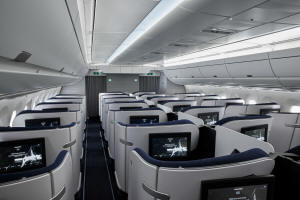Airspace closures send airlines on detours, add to cargo woes
 Send a link to a friend
Send a link to a friend
 [February 28, 2022] By
Anne Kauranen [February 28, 2022] By
Anne Kauranen
HELSINKI (Reuters) - Airlines on Monday
braced for a potentially lengthy sanctions war after the EU banned
Russian airlines and Moscow pledged to retaliate.
Dozens of flights were cancelled or sent on costly detours as the crisis
hit airline shares.
The rerouting meant Kazakhstan's airspace saw a tripling of flights to
more than 450.
Airline industry executives said they were expecting Russia to ban their
use of routes crossing the country after the European Union on Sunday
banned Russian airlines as fighting raged in Ukraine.
On Monday, the Kremlin said there would be a response to Western
sanctions against Russia's aviation industry.
"The guiding principle will be reciprocity, and our own interests will
be at the forefront of that," Kremlin spokesperson Dmitry Peskov told
reporters on a conference call.
Without access to Russia's airspace, carriers will have to divert
flights south while also avoiding areas of tension in the Middle East.

Shares in European airlines and airport operators were down 3-6% in
early trade, while Finnish national carrier Finnair cut its guidance and
saw its shares tumble 23%.
Germany's Lufthansa said 30 flights to Russia would be cancelled this
week by Lufthansa and its subsidiaries Eurowings and Austrian Airlines,
while Latvia's AirBaltic said it was extending its suspension of flights
to Russia until the end of May.
Lufthansa said its flights from Europe to Tokyo and Seoul would have to
fly detours for which the company had secured necessary flight rights.
In Asia Singapore Airlines said on Monday it was suspending all services
between Singapore and Moscow until further notice for "operational
reasons".
Finnair scrapped its 2022 guidance, fearing significant loss of business
as it uses a route across Russian skies from Europe to Asia via its hub
in Helsinki.
[to top of second column] |

A general view of the business class cabin of a Finnair A350
aircraft is pictured in Helsinki, Finland December 3, 2021. Finnair/Handout
via REUTERS

Korean Air, Japan Airlines and Japan's ANA Holdings said on Monday they were
continuing to use Russian airspace but had no plans to add flights to Russia or
Europe to replace flights cancelled by European carriers.
Demand to Japan and South Korea has been low due to COVID-related travel
restrictions.
Airline Swiss, also owned by Lufthansa Group, said it would continue to fly to
Russia as Switzerland has not banned Russian airlines.
MORE SUPPLY CHAIN DISRUPTION
Airspace shutdowns and flight cancellations will also set to affect cargo
traffic, further exacerbating global supply chain woes caused as the pandemic
slows cargo handling worldwide.
"Due to the ongoing dramatic developments in the Russia-Ukraine conflict,
Lufthansa will no longer use Russian airspace," Lufthansa Cargo said.
U.S.-based United Parcel Service Inc and FedEx Corp, two of the world's largest
logistics companies, said they were halting deliveries to Russia.
Global aircraft also lessors said they would have to terminate hundreds of plane
leases with Russian carriers in the wake of EU sanctions that call for such
contracts to end by March 28.
Russia's Aeroflot said on Sunday it would cancel all flights to European
destinations after EU foreign policy chief Josep Borrell said the EU had decided
to close its airspace to Russian traffic.
The United States is considering similar action, but has yet to make a final
decision, according to U.S. officials.
The U.S. government said on Sunday citizens should consider leaving Russia
immediately on commercial flights, citing an increasing number of airlines
cancelling flights as countries close their airspace to Russia. [L1N2V307H]
(Reporting by Anne Kauranen in Helsinki, Maki Shiraki in Tokyo, Joyce Lee in
Seoul, Aradhana Aravindan in Singapore and Ilona Wissenbach in Berlin; editing
by Jason Neely)
[© 2022 Thomson Reuters. All rights
reserved.]This material may not be published,
broadcast, rewritten or redistributed.
Thompson Reuters is solely responsible for this content. |